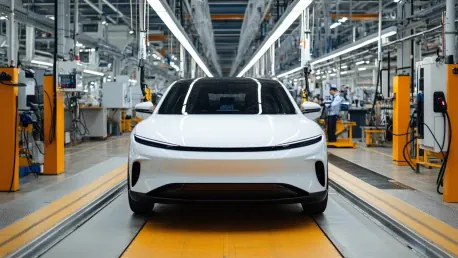Thailand is rapidly transforming into a central hub for electric vehicle (EV) manufacturing in Asia, driven by an array of government policies and substantial investments from global automakers. The Thai government’s initiatives, including tax breaks and subsidies, aim to achieve an ambitious target known as the “30@30” goal, which aims for 30% of all vehicles manufactured in the country to be electric by 2030. These forward-thinking policies have not only attracted major international companies like BYD and BMW but have also invigorated the local economy by creating jobs and stimulating technological advancement.
Government Policies and Incentives
The Thai government has been proactive in creating an environment conducive to EV manufacturing by rolling out a series of incentives designed to lure in investors and manufacturers. Tax breaks and subsidies are at the forefront of these initiatives, making it financially attractive for companies to set up their operations in Thailand. This strategic approach aligns with the country’s broader environmental objectives and its ambition to reduce carbon emissions.
The “30@30” initiative, a cornerstone of Thailand’s EV strategy, underlines the country’s commitment to making 30% of its vehicle production electric by 2030. This policy has not only attracted foreign investments but has also encouraged local manufacturers to adapt to the shifting automotive landscape. It’s a win-win scenario where both the economy and the environment stand to gain. Beyond financial incentives, the Thai government is also investing in infrastructure, such as EV charging stations, to support the growth of the sector.
Major Investments by Global Automakers
Global automotive giants have shown keen interest in Thailand’s burgeoning EV market, making significant financial commitments to establish manufacturing bases in the country. BYD’s new $900 million factory in Rayong is a prime example of this interest, with an annual production capacity slated to reach 150,000 vehicles. This facility marks BYD’s first foray into EV manufacturing outside of China, underscoring the attractiveness of Thailand as a manufacturing hub.
BMW, another key player, has been in Thailand since 2000 and plans to produce its first locally manufactured EVs by 2025. The company’s commitment is further solidified by its new high-voltage battery plant, which will supply the necessary components for EV production. Other automakers, including Great Wall Motor, Hozon New Energy Automobile, SAIC Motor, and Japan’s Isuzu Motors, have also pledged substantial investments. These developments, combined with commitments from industry heavyweights like Toyota, Honda, Hyundai, and Mercedes-Benz, highlight Thailand’s growing importance in the global EV market.
Local Supply Chain Establishment
A critical element for sustaining Thailand’s growth as an EV hub is the establishment of a localized supply chain. The integration of local suppliers ensures a steady and reliable flow of necessary components, reducing dependency on imports and fostering local industries. Chinese battery maker SVOLT Energy Technology has taken a significant step in this direction by beginning the production of EV battery packs in early 2024, in collaboration with Thai energy company Banpu Next.
Additionally, Changan has announced partnerships with Thai parts manufacturers to support its EV production, slated to commence in 2025. These strategic collaborations are essential for creating a sustainable and competitive automotive ecosystem. They help establish a robust network of local suppliers capable of meeting the high standards required for EV manufacturing. This focus on local supply chains not only enhances the resilience of Thailand’s EV industry but also generates economic benefits for local businesses and communities.
Growing Market and Future Prospects
Thailand is swiftly evolving into a key player in the electric vehicle (EV) manufacturing sector in Asia, spurred by a blend of strategic government policies and hefty investments from international automakers. The Thai government has rolled out a series of initiatives, including tax incentives and subsidies, all aimed at meeting an ambitious objective called the “30@30” goal. This initiative aspires for 30% of all vehicles produced in Thailand to be electric by the year 2030. Such forward-looking policies have succeeded in drawing big-name global companies like BYD and BMW to invest in the country. These investments are not only enhancing the EV sector but are also boosting the local economy by generating employment opportunities and fostering technological advancements. The influx of foreign direct investment is enhancing Thailand’s industrial landscape, making it a pivotal point in the global supply chain of electric vehicles. Consequently, Thailand is well on its way to establishing itself as a powerhouse in the EV industry within the region.









